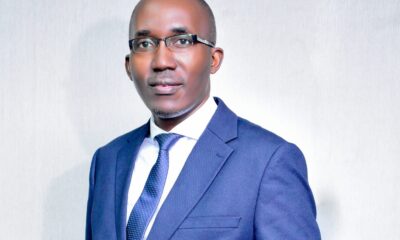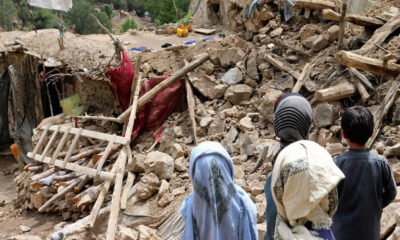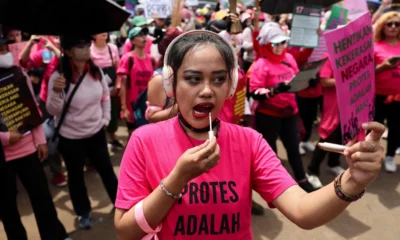World News
Recognising Palestinian state must not distract from ending Gaza mass deaths, UN expert says
The United Nations special rapporteur for the occupied territories has warned that moves to recognise a Palestinian state should not distract member states from stopping mass death and starvation in Gaza.
“Of course it’s important to recognise the state of Palestine,” Francesca Albanese told the Guardian after several more countries responded to the mounting starvation in Gaza by announcing plans to recognise an independent Palestine. “It’s incoherent that they’ve not done it already.”
But she argued that the prolonged debate around Palestinian statehood has so far yielded no political progress, and instead enabled the spread of illegal Israeli settlements in occupied territory, which have all but precluded the possibility of a Palestinian state.
“The territory has been literally eaten out by the advancement of the annexation and colonisation,” she said.
This week, Australia joined the United Kingdom, Canada, France and other countries in pledging to recognise a Palestinian state at the United Nations General Assembly next month. The prime minister, Anthony Albanese (no relation), described the two-state solution as “humanity’s best hope to break the cycle of violence in the Middle East”.
But the special rapporteur cautioned that the renewed push for Palestinian statehood should not “distract attention from where it should be: the genocide”
She called for an embargo on all arms sales to Israel and a cessation of trade agreements, as well as accountability for the war crimes and crimes against humanity with which the International Criminal Court has charged top Israeli officials. She also called for a complete Israeli withdrawal from occupied territory by the 17 September deadline set by the UN General Assembly.
“Ending the question of Palestine in line with international law is possible and necessary: end the genocide today, end the permanent occupation this year, and end apartheid,” she said. “This is what’s going to guarantee freedom and equal rights for everyone, regardless of the way they want to live – in two states or one state, they will have to decide.”
In her three years as rapporteur, but especially since the beginning of Israel’s war in Gaza following the 7 October 2023 Hamas attacks, Albanese has become one of the most outspoken and recognisable advocates for Palestinian rights. Her technical reports accusing Israel of operating an “apartheid regime” and committing “acts of genocide” have often anticipated major international and Israeli rights groups reaching the same conclusions.
Last month, the Trump administration sanctioned Albanese over her outspoken support for Palestinian rights and what US officials called her “shameful promotion” of ICC action against Israeli officials.
While Albanese has described herself as a reluctant “chronicler of genocide”, and others have called her “the voice of the global conscience”, she has also drawn condemnation and attacks – including accusations of antisemitism so persistent that she at one point sat down for a TV interview in which the first question posed to her was: “Are you an antisemite?”
“Antisemitism and discrimination against Jews as Jews is gross,” Albanese told the Guardian in an earlier interview in December. “But frankly, I couldn’t care less if Israel were run by Jews, Muslims, Christians or atheists… All I want is for Israel to conduct itself in line with international law.”
Albanese described the growing global split over Israel’s actions in Gaza as “the ultimate struggle” and a matter of “light and darkness”. She characterised the US’s sanctions against her as a sign not of strength, but of guilt”.
“The US is a country of contradictions, full of ideals and principles and still, plotting against democratic values,” she said. “Those in power – Democrats or Republicans – have always been led by this kind of supremacist logic toward others, and this strategy is openly betraying the US values of democracy, of fundamental freedoms, and really leveling everything that they have been preaching.”
She also criticized the UN secretary general, António Guterres, for failing to more forcefully condemn the “unprecedented violation” of the privileges and immunities traditionally afforded to UN representatives.
A spokesperson for Guterres said earlier that the sanctions against her set a dangerous precedent, but noted that Albanese does not report to him. The rapporteur’s mandate is entrusted by the UN Human Rights Council.
Albanese described the recent gathering of the Hague Group – a 30-nation conference held in Colombia to set out practical steps for UN member states to take measures in support of Israel ending the occupation, as “an ethical force inside the system”, which she said was “premised upon a basic respect of international law and the honoring of multilateralism, which seems to me the basic ingredient to have a functioning international community”.
That stands in contrast to a UN that Albanese believes is living a “moment of existential crisis”.
“[The UN] needs to decide whether to be a real, multilateral platform,” she said. “We are no longer in the settler-colonial bloc kind of mentality that conceived the birth of the UN. Now there are 193 member states, and all of them have agency and all of them must be respected. Now is the time to cut the umbilical cord from the veto-power mentality and put the emphasis on the general assembly.”
Albanese noted that Israel’s 21-month war in Gaza had prompted a “profound shift” in global views of the conflict, as well as “brutal repression”.
“We see millions of people taking to the streets and asking for an end to the genocide, and they’re being beaten and arrested and held on counts of terrorism, while those who are wanted by the ICC for war crimes are being received and allowed to fly over European and Western space,” she said. “This is absurd. This is the end of the rule of law.”
International law, she added, “is not a prophecy … It is a tool that must be used in order to fix things. And in fact, when people use it in court, they generally win.”
But she sounded a note of optimism about the shifting discourse around Israel’s actions. “An entire new generation now speaks the language of human rights,” she said. “For me, this is a success in and of itself.”
The widening gap between those in power and millions of people that have taken to the streets worldwide in support of Palestinians is in part why her most recent report focused not on Israeli actions but on the global corporations that she says are “profiting from genocide”.
“The occupation is profitable, and so is the genocide, and this is shocking, but it is to be known in order to be seen and to be stopped,” she noted. “The power is not just with the prime ministers or with the governments. The power is with us, and we can start choosing through our wallet.”
As for Palestinians, despite their monumental suffering and the ever-mounting death toll, “they have already won the legitimacy battle,” Albanese said.
“Everyone knows what Israel has done to them for the past 77 years,” she said. “They’ve already made history – and not through violence as some try to portray them – but with their perseverance and principles and trust in the justice system, which has not been their ally.”
Source: The Guardian
Comments



























